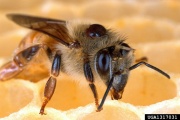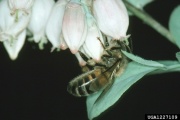Difference between revisions of "Honey"
Jump to navigation
Jump to search
m (Text replace - "== Authority ==" to "== Sources Checked for Data in Record ==") |
|||
| (One intermediate revision by the same user not shown) | |||
| Line 10: | Line 10: | ||
med (Ces.); honning (Dan., Nor.); Honig (Deut.); miel (Esp., Fr.); miele (It.); honing (Ned.); miód (Pol.); mel (Port.); honung (Sven.) | med (Ces.); honning (Dan., Nor.); Honig (Deut.); miel (Esp., Fr.); miele (It.); honing (Ned.); miód (Pol.); mel (Port.); honung (Sven.) | ||
| − | == | + | == Physical and Chemical Properties == |
Soluble in water. May granulate at 50º and 65º F (10º and 18º C). pH = 3.2-4.5 | Soluble in water. May granulate at 50º and 65º F (10º and 18º C). pH = 3.2-4.5 | ||
| − | |||
| − | |||
| − | |||
| − | |||
== Additional Images == | == Additional Images == | ||
| Line 25: | Line 21: | ||
</gallery> | </gallery> | ||
| − | + | == Resources and Citations == | |
| − | == | + | * University of Waikato: [http://bio.waikato.ac.nz/honey/honey_intro.shtml Honey Research Unit ] |
| − | |||
* R. J. Gettens, G.L. Stout, ''Painting Materials, A Short Encyclopaedia'', Dover Publications, New York, 1966 Comment: p. 29; 20% water | * R. J. Gettens, G.L. Stout, ''Painting Materials, A Short Encyclopaedia'', Dover Publications, New York, 1966 Comment: p. 29; 20% water | ||
* G.S.Brady, ''Materials Handbook'', McGraw-Hill Book Co., New York, 1971 Comment: p. 95 | * G.S.Brady, ''Materials Handbook'', McGraw-Hill Book Co., New York, 1971 Comment: p. 95 | ||
| − | * ''Encyclopedia Britannica'', http://www.britannica.com Comment: "Honey." | + | * ''Encyclopedia Britannica'', http://www.britannica.com Comment: "Honey."; water = 18% (Accessed 14 Apr. 2004). |
| − | * Wikipedia | + | * Wikipedia: http://en.wikipedia.org/wiki/Honey (Accessed Feb. 2, 2006) - water = 14-18% |
* Richard S. Lewis, ''Hawley's Condensed Chemical Dictionary'', Van Nostrand Reinhold, New York, 10th ed., 1993 | * Richard S. Lewis, ''Hawley's Condensed Chemical Dictionary'', Van Nostrand Reinhold, New York, 10th ed., 1993 | ||
Latest revision as of 14:44, 19 August 2020
Description
A sweet, viscous fluid produced by bees from the nectar of flowers. Honey is a mixture of Fructose, Glucose, Dextrose and water (~14-20%) with trace amounts of enzymes and oils. Its composition varies slightly depending on the source of nectar. Honey was used since early times as a sweetener and as a plasticizing additive to watercolors, Tempera, Size, and Glair.
Synonyms and Related Terms
med (Ces.); honning (Dan., Nor.); Honig (Deut.); miel (Esp., Fr.); miele (It.); honing (Ned.); miód (Pol.); mel (Port.); honung (Sven.)
Physical and Chemical Properties
Soluble in water. May granulate at 50º and 65º F (10º and 18º C). pH = 3.2-4.5
Additional Images
Resources and Citations
- University of Waikato: Honey Research Unit
- R. J. Gettens, G.L. Stout, Painting Materials, A Short Encyclopaedia, Dover Publications, New York, 1966 Comment: p. 29; 20% water
- G.S.Brady, Materials Handbook, McGraw-Hill Book Co., New York, 1971 Comment: p. 95
- Encyclopedia Britannica, http://www.britannica.com Comment: "Honey."; water = 18% (Accessed 14 Apr. 2004).
- Wikipedia: http://en.wikipedia.org/wiki/Honey (Accessed Feb. 2, 2006) - water = 14-18%
- Richard S. Lewis, Hawley's Condensed Chemical Dictionary, Van Nostrand Reinhold, New York, 10th ed., 1993
- Van Nostrand's Scientific Encyclopedia, Douglas M. Considine (ed.), Van Nostrand Reinhold, New York, 1976
- Random House, Webster's Encyclopedic Unabridged Dictionary of the English Language, Grammercy Book, New York, 1997
- The American Heritage Dictionary or Encarta, via Microsoft Bookshelf 98, Microsoft Corp., 1998



